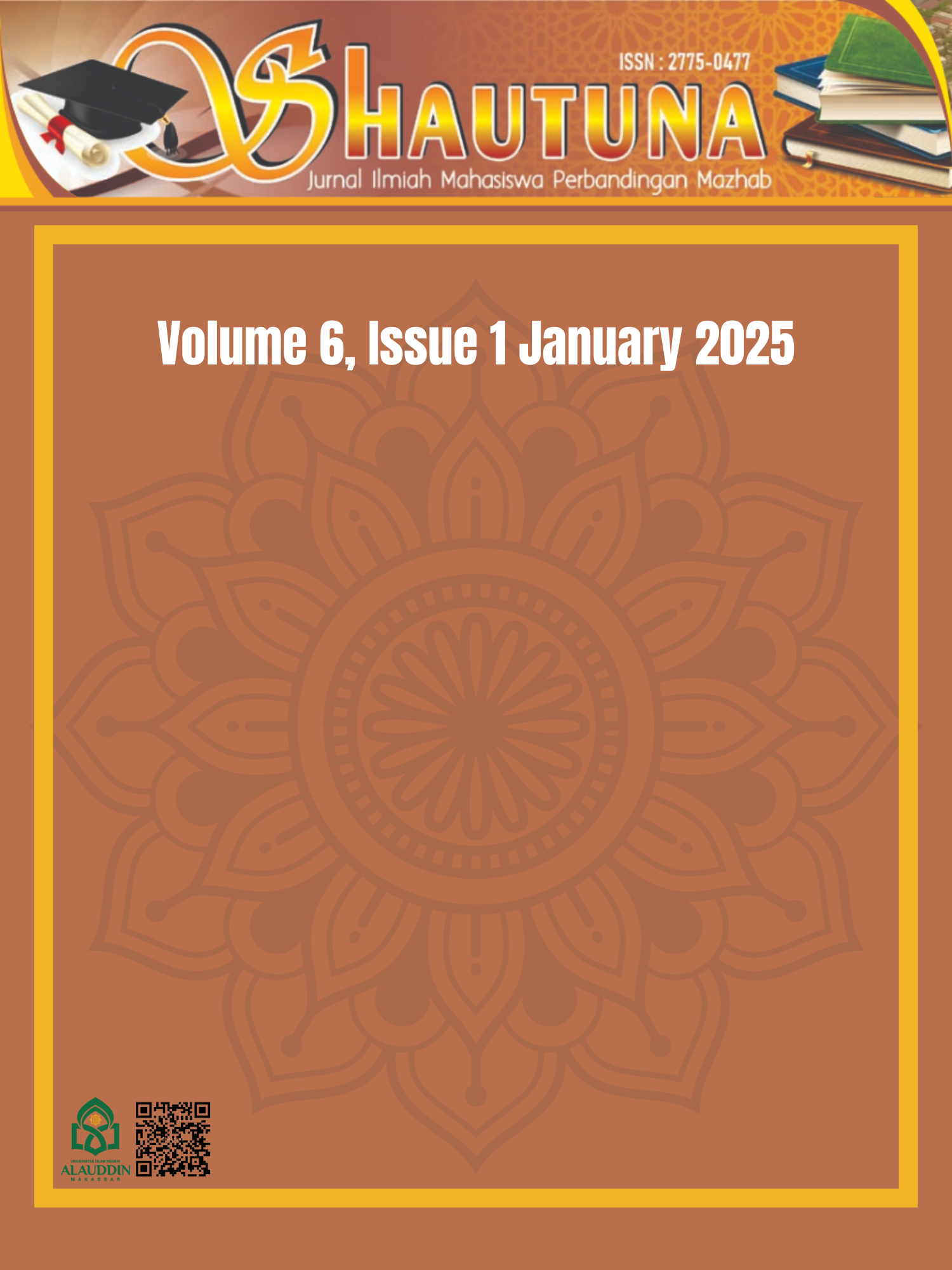Religious Reality in MUI Fatwa Number 2 of 2022 on Uang Panai'
A Philosophical Analysis of the Social Dynamics of the Makassar Bugis Community
DOI:
https://doi.org/10.24252/shautuna.v6i1.55424Keywords:
Religious Reality, MUI Fatwa Number 2 of 2022, Uang Panai, Philosophical, Social Society, Makassar Bugis TribeAbstract
The tradition of money panai in the marriage of the Makassar Bugis people not only reflects cultural values and family honor, but also gives birth to social dynamics and religious issues, especially in the practice of borrowing money from the family. This research aims to analyze in depth the religious reality surrounding the practice of money and identify the typology of Islamic law that arises from this phenomenon. The method used is a descriptive qualitative research with a philosophical and sociological approach, which focuses on the analysis of cultural practices in the local context of the Makassar Bugis community. Data were collected through participatory observation, in-depth interviews with traditional leaders, scholars, and couples who have experienced money loans, as well as documentation and normative literature reviews. The results of the study show that the practice of borrowing money has become a plural social reality and is even considered a pragmatic solution in meeting customary demands. However, this practice also raises complex legal problems, especially in the perspective of Islamic law. Normatively, a panai loan is categorized as mubah if it does not cause harm or burden the groom. On the other hand, this practice can be haram if it has implications for disproportionate economic pressure or is carried out with detrimental speculative intentions. These findings show that people's perceptions of Islamic law in the context of money are contextual and varied, depending on social motives, agreements between families, and locally applicable religious interpretations. This research emphasizes the need for a more adaptive approach to Islamic law to local traditions without ignoring the principles of justice and benefit.
References
Almaida, Heny. “Tingginya Uang Panai Bugis Sidrap: Mengangkat Derajat Perempuan Atau Membebani Laki-Laki Untuk Menikah?” AL-MANHAJ: Jurnal Hukum Dan Pranata Sosial Islam 5, no. 2 (2023): 1155–68. https://doi.org/10.37680/almanhaj.v5i2.2684.
Dahnia, Whustoh, Baidar Baidar, and Wiwik Gusnita. “Makanan Adat Manjapuik Marapulai Pada Acara Perkawinan Di Nagari Mungka Kecamatan Mungka Kabupaten Lima Puluh Kota.” Journal of Home Economics and Tourism 15, no. 2 (2017): 2021. https://ejournal.unp.ac.id/index.php/jhet/article/view/10553/7720.
Darussalam, Muhammad Faisal. “Dampak Psikologis Laki-Laki Terhadap Tingginya Uang Panai (Belanja Pernikahan) Di Kecamatan Mattirobulu Kabupaten Pinrang.” IAIN Parepare, 2020.
Fitriyani, Fitriyani. “Multicomplex Uang Panai’ Terhadap Perempuan Dalam Perkawinan Keluarga Muslim Suku Bugis.” Tasyri’ : Journal of Islamic Law 1, no. 2 (2022): 195–214. https://doi.org/10.53038/tsyr.v1i2.37.
Giu, Andi Rahman. “Tradisi Mahar Dan Antar Harta Pada Perkawinan Masyarakat Muslim Di Kota Manado (Suatu Tinjauan Sosial Kultural).” Dialog 43, no. 1 (2020): 119–38. https://doi.org/10.47655/dialog.v43i1.365.
Isnaini, Nur. “Konsep Pembentukan Islamic Branding Tinjauan Etika Bisnis Islam.” Jurnal Ekonomika Dan Bisnis Islam 5, no. 3 (2022): 127–44. https://doi.org/10.26740/jekobi.v5n3.p127-144.
Junita, Junita, and Mualimin Mualimin. “Dakwah Kultural Dalam Tradisi Maantar Jujuran Suku Banjar Di Samuda Kotawaringin Timur (Cultural Dakwah in The Maantar Jujuran Tradition of The Banjar in Samuda Kotawaringin Timur).” Jurnal Dakwah Risalah 31, no. 2 (2021): 138–53. https://doi.org/10.24014/jdr.v31i2.10581.
Karvina, Karvina. “Uang Panai Dan Implikasi Sosial Terhadap Tingkat Perceraian (Studi Kasus Kec. Panca Rijang Kab. Sidenreng Rappang).” IAIN ParePare, 2023.
Maita, Rafel, Vasco Javarison Zacharias, Tomi Hutasoit, Edwardo Cipta Haider, and Vehrial Vahzrianur. “Perjudian Dalam Kerangka Hukum Ekonomi Syariah: Tinjauan Terhadap Maysir Dan Konsekuensinya.” Media Hukum Indonesia (MHI) 2, no. 2 (2024): 139–50. https://doi.org/10.5281/zenodo.11212490.
Mukhlishin, Ahmad, Aan Suhendri, and Muhammad Dimyati. “Metode Penetapan Hukum Dalam Berfatwa.” Al-Istinbath : Jurnal Hukum Islam 3, no. 2 (2018): 167. https://doi.org/10.29240/jhi.v3i2.444.
Mustafa, Zulhas’ari. “Problematika Pemakanaan Teks Syariat Dan Dinamika Maslahat Kemanusiaan.” Mazahibuna: Jurnal Perbandingan Mazhab 2, no. 1 (2020): 37–58. https://doi.org/10.24252/mh.v2i1.14282.
Mutakin, Ali. “Fiqh Ekologi; Upaya Merawat Lingkungan Hidup Berbasis Konsep Maqashid Syariah.” Syariah: Journal of Fiqh Studies 1, no. 2 (2023): 107–26. https://doi.org/10.61570/syariah.v1i2.31.
Putra, Panji Adam Agus. “Konsep Perbuatan Melawan Hukum Perspektif Hukum Ekonomi Syariah.” Gorontalo Law Review 4, no. 1 (2021): 57–74. https://doi.org/10.32662/golrev.v4i1.1404.
Rinaldi, Rinaldi, Agus Bambang Nugara, and Lukman Ismail. “Uang Panai Sebagai Harga Diri Perempuan Suku Bugis Bone: Antara Adat Dan Agama.” Jurnal Pendidikan Sosiologi Undiksha 5, no. 1 (2023): 1–13. https://ejournal.undiksha.ac.id/index.php/JPSU/article/view/64559.
Syihab, Muhammad Baiquni. “Telaah Kritis Pemikiran Jasser Auda Dalam Buku ‘Maqasid Al-Shariah as Philosophy of Islamic Law: A Systems Approach.’” AN NUR: Jurnal Studi Islam 15, no. 1 (2023): 114–36. https://doi.org/10.37252/annur.v15i1.455.
Taufika, Ryan, Tohap Pandapotan Simaremare, Vinda Chairunnisa, and Tengku Syarifah Nadhira. “Overview of Traditional Law in the Use of Mayam as Mahar in Aceh Traditional Marriage.” Jurnal Civics: Media Kajian Kewarganegaraan 18, no. 2 (2021): 296–303. https://doi.org/10.21831/jc.v18i2.44945.
Tius, Tommy. “Makna Dan Fungsi Tradisi Sinamot Dalam Pernikahan Batak Toba Di Kecamatan Mandau.” Jurnal Online Mahasiswa (JOM) Bidang Ilmu Sosial Dan Ilmu Politik 5, no. 2 (2018): 1–15. https://jom.unri.ac.id/index.php/JOMFSIP/article/view/21854/21148.
Winda, Winda, Kadek Hemamalini, Anak Agung Oka Puspa, and I Made Biasa. “Kajian Adat Jujuran Dalam Perkawinan Suku Dayak Meratus Di Desa Kadayang Kalimantan Selatan.” Widya Genitri: Jurnal Ilmiah Pendidikan, Agama Dan Kebudayaan Hindu 11, no. 2 (2020): 148–57. https://doi.org/10.36417/widyagenitri.v11i2.386.
Zamrodah, Yuhanin. “Kedudukan Fatwa Majelis Ulama Indonesia (MUI) Dalam Perspektif Hukum Islam Dan Nasional: Studi Implikasi Fatwa Terhadap Masyarakat.” NIZHAM: Jurnal Studi Keislaman 15, no. 2 (2016): 1–23. https://doi.org/10.32332/nizham.v8i01.2103.
Wawancara
Muh. Yusuf (44 Tahun), Tokoh Masyarakat, Wawancara, Gowa, 20 Juni 2022.
Arif (40 Tahun), Tokoh Masyarakat, Wawancara. Kabupaten Gowa, 22 Juni 2022.
Andi Zulfikar (42 Tahun), Tokoh Masyarakat, Wawancara, Kabupaten Gowa, 22 Juni 2022.
Ahmad Mujahid (55 Tahun), Tokoh agama, Wawancara, Makassar, 10 Juli 2022
Abd. Hamid (55 Tahun), Tokoh Agama, Wawancara, Makassar, 13 Juli 2022.
Nurul Rezkiyah Wahyuningsih (22 Tahun), Calon mempelai. Wawancara, Makassar 20 Juli 2022.
Downloads
Published
How to Cite
Issue
Section
License
Copyright (c) 2025 Achmad Musyahid Idrus, Abdul Rahman Qayum, Rahmawati Abbas, Tahani Asri Maulidah

This work is licensed under a Creative Commons Attribution 4.0 International License.









